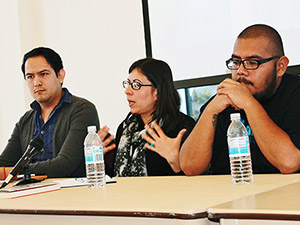
Each wearing a cap and gown, 30 undocumented immigrants boldly walked up to a legal port of entry in Texas, determined to return to the place they grew up after voluntarily crossing into Mexico to visit their families.
Being questioned as to where they were going, they respond with no hesitation, “home.”
“As you’re walking across the border they can’t really do anything to you. There was a powerful vibe when we were crossing the border,” said Luis Rivera, 17, who was one of those 30.
A panel of protesters and activists, which included Rivera, held a discussion about immigration at CSUN on Tuesday morning, which was hosted by the journalism department and El Nuevo Sol.
The discussion focused on the recent developments in immigration policies and why it needs reform and how it can be changed to help undocumented immigrants.
The panel also highlighted the work done so far by immigration rights activists such as Dream 30, which is organized by the National Immigrant Youth Alliance (NIYA).
The group, ranging from ages 13 to 30, hopes to defy current immigration laws while challenging restrictions created by borders.
“You have the power,” Rivera said. “When you have the support of 30 dreamers behind you, you don’t worry what [border patrol] is going to do to you.”
According to panelist and NIYA representative Alma De Jesus Ramirez, more than 1,000 people are deported from the U.S. everyday under Obama’s immigration policy.
This number is higher than it was during Bush’s presidency.
“You have to think of the generations coming behind you. You can’t just think about how this is going to affect you individually, this is something that affects our communities and our country as a whole,” said Ramirez.
The Dream 30 are currently on their eighth day of a hunger strike while being detained by U.S. officials for attempting to cross into Mexico with the intention of returning through a legal port of entry in Laredo, Texas, and declaring their undocumented immigration status to officials.
“The hunger strike is a very powerful action,” Rivera said. “They were going to force feed them through a tube if they didn’t eat for a certain number of days. When it gets to the point where they start worrying about your health it’s powerful.”
Rivera returned home to Los Angeles after he was released from a juvenile detention center in San Antonio on Oct. 14.
But not everyone has been fortunate enough to return back home to the U.S. Rocio Hernandez, a member of the Dream 30, was deported to Mexico City on Oct. 29.
“You should care because we’re talking about human beings,” said Jose Rosas, a member of the group Dreams to be Heard at CSUN, an organization advocating for immigrant rights. “We’re talking about basic human rights.”
Rosas also said immigration policies are more than politics. This is about people’s life as well as their experience and this is why we need to listen.
“Their lives and experiences are on the line and that’s why you should care.” Rosas said. “They’re yelling at you, ‘we are here, we live in this community amongst you guys. It’s the reality.”






